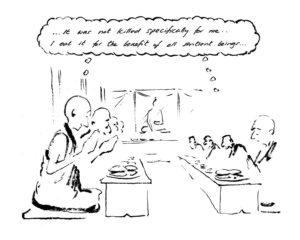Definition of the Week (54): Phenomenon (dharma)
[Updated]
The Sanskrit word dharma (Tib. cho) has two meanings:
- Phenomenon
- Teaching
The definition of dharma is holding its own identity. If something holds its own identity it eliminates another identity as being itself. For example, mind holds its own identity of being clear & knowing, which eliminates the possibility for it to be matter, i.e. being atomically established.
In the context of the teachings, a dharma mind holds its own identity of virtue, which eliminates the identity of non-virtue from the mind.
☞ Purbu Chock:
Definition: That holding its own identity.
Phenomenon is synonymous with existent. To exist it has to possess an identity, and that which does not exist does not hold an identity.
To be empty of inherent existence, it has to possess an identity, because it has to be a dependent arising.
☞ Chandrakirti:
Any definitions of compounded phenomena [6.215]
And any definitions of non-compounded phenomena,
The emptiness of that alone,
It is the emptiness of definitions.
☞ The First Dalai Lama Gyalwa Gedun Drub:
Take the subject ‘the emptiness of the quintessential nature of the definitions of compounded and non-compounded phenomena alone’ – it is the emptiness of definitions – because it is the emptiness that is the lack of the true existence of definitions.
☞ The appearing desirability that gives rise to attachment, and the appearing darkness giving rise to anger, these do not hold their own identity. Running after them one is just running after one’s projections.





